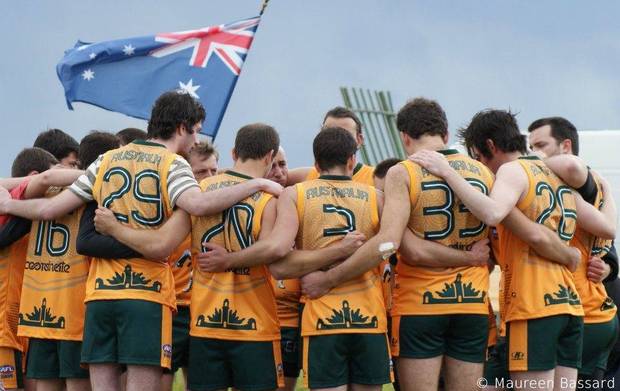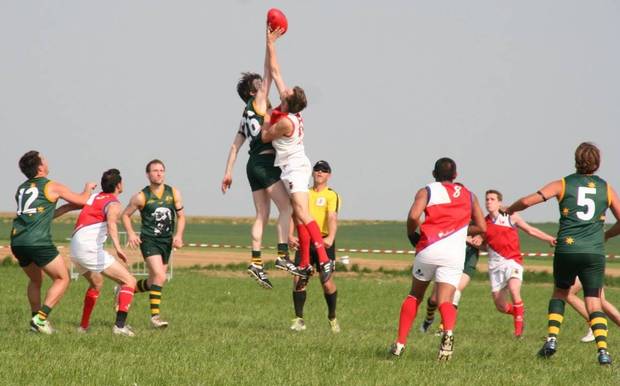On a makeshift ground opposite the Australian War Memorial in Villers-Bretonneux, an annual Aussie rules match is held to commemorate the past, and also further strengthen ties between the two countries.
The annual Anzac Day Cup – now in its fifth year – features two sides of amateur but passionate footballers, one from Australia, the other France.
So, why does the tiny village of Villers-Bretonneux (population roughly 4000) boast one of only a handful of full-size Australian Rules ovals in France, carefully looked after by a small band of volunteers?
And why does it host an annual contest of a sport so foreign to most French people?
It's part of the moving and heart-warming commemoration of the liberation of the community by Australians during the First World War, three years after the horrors and heroism of Gallipoli.
The tiny village played host to two brutal battles, the second of which proved crucial to the war's outcome.
The people of the town never forgot the bravery of the Australian soldiers, while the local school was rebuilt using donations from the children of Victoria, many of whom had relatives perish in the town's liberation. Today, signs can be seen around the school with the inscription "N'oublions jamais l'Australie" (Let us never forget Australia).

The emotional connection remains strong. Last year, the AIS-AFL Academy visited the region, conducting an Auskick clinic with 300 local students. The squad also paid its respect to the sacrifices made by Australian soldiers at the war memorial.
But the annual Anzac Day Cup isn't about elite-level football. It's about passion, pride and paying respects to those long-departed. The contest is played out in front of the graves of over 770 Australian soldiers, as well as those of other British Empire soldiers involved in the campaign.
During Anzac week there are many and varied activities, some extremely sombre, but the football game is a chance to lighten the mood and spread the word of Australia's indigenous game.
The match usually attracts only a small clump of spectators – some visiting Australians, expats living in Europe, and a few keen and/or curious locals – but its importance cannot be understated.

The home side features the best Frenchmen picked from a small but growing local league, while their opponents are made up (mostly) of a random mix of visiting Australians.
Of course, it also features several quirks that would never be seen at an AFL match.
On game day, each player is given a ticket split in two halves - one for an aperitif, one for lunch of a fresh baguette with ham or pate, salad, and fruit - to be consumed before the game. A very French twist to an Australian tradition.
The score isn't vital, CNFA (the governing body of Australian football in France) president Thomas Urban told AFL.com.au.
"In France, the WW1 remembrance has lost some of its profile, and CNFA believes that it is important to remember those who fell for us and our future," he said.
"The score of the game doesn’t matter - the friendship between our two countries is the most important. That’s why together we created the Anzac Cup: to keep the spirit alive."
Ben MacCormack, general manager of AFL Europe, says he receives countless emails from Australians desperate to take part in the game.
The requests are heartfelt, with young men pleading to take part to honour family connections to the area.
"It is truly one of the most amazing football experiences of my life. The town's people are so dedicated and thankful to Australians still 100 years on," MacCormack told AFL.com.au.
"We have some great stories from players who were present and their connection to the match."

Some of the requests for this year's game included a 30-year-old from country Victoria, who played last year but got a piece of flint stuck in his knee and was hospitalized. But, due to his deep family link with the area (his great grandfather was a soldier during the war and remained in the north of France after the war finished, as part of a mission to identify the bodies of his fallen compatriots), he was desperate to take the field again.
There are countless others - a Sydney-sider living in London, a Melburnian studying in Holland, an Englishman with Australian blood, a Bendigo native living in Switzerland who hopes to take part in the contest before returning home. All have emotional ties to the small, sleepy village.
It's a feeling that's mutual.
Anyone interested in playing football in France or Europe can visit www.football-australien.fr and www.afleurope.org
Niall Seewang is a sub-editor at AFL Media. You can follow him on Twitter @AFL_NSeewang



